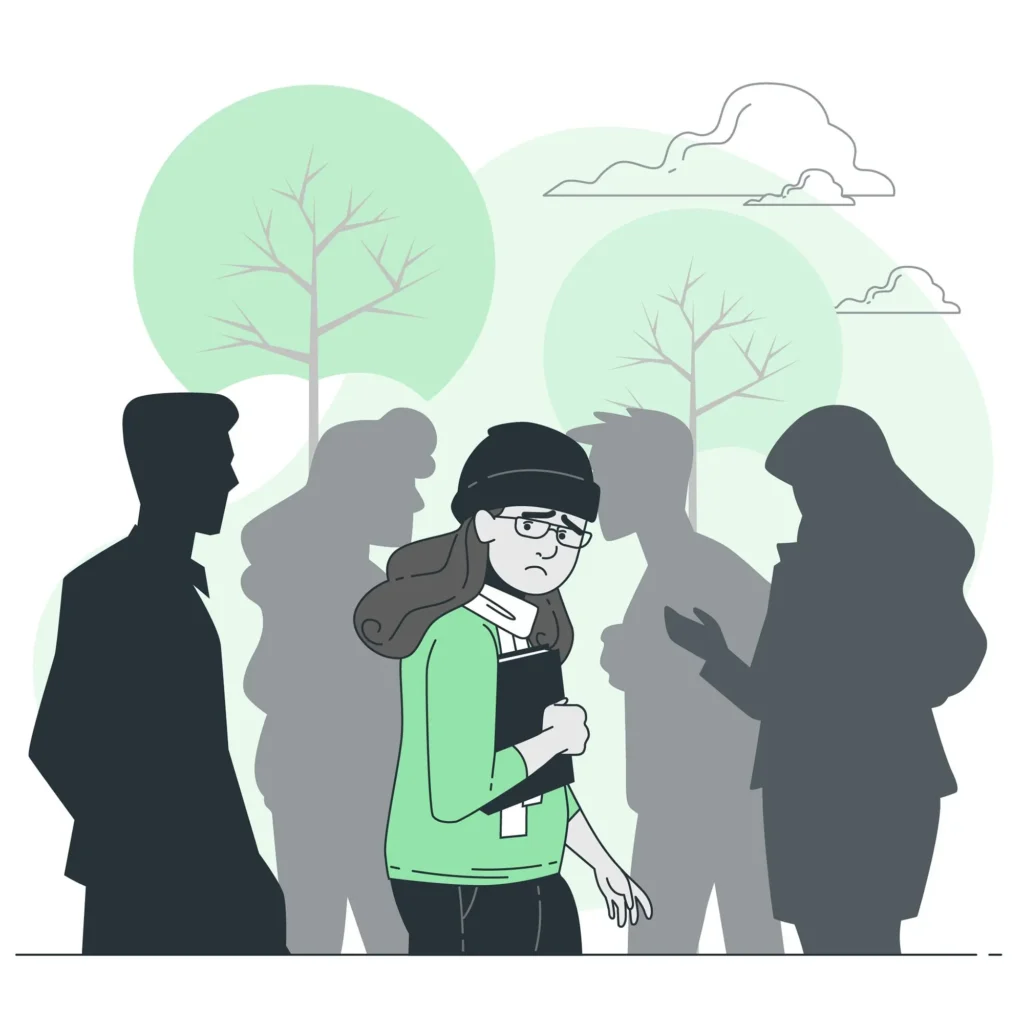Social phobia, also known as social anxiety disorder, is a type of anxiety disorder that involves intense fear or discomfort in social situations. Individuals with social phobia may feel self-conscious, embarrassed, or judged in social situations, leading to avoidance of such situations altogether. The fear of being negatively evaluated by others can have a significant impact on a person’s personal and professional life, affecting their ability to form relationships, pursue career opportunities, and participate in social activities.
Symptoms of Social Phobia
Individuals with sociophobia experience significant distress and avoidance of communal situations, which can interfere with daily activities, personal relationships, and career opportunities. Here are some common symptoms of social phobia:
Physical Symptoms
People with social phobia may experience a range of physical symptoms in communal situations, including sweating, blushing, trembling, rapid heartbeat, shortness of breath, dizziness, stomach discomfort, and muscle tension. These physical symptoms are often a result of the body’s natural response to perceived threats.
Emotional Symptoms
Anxiety, fear, and feelings of intense discomfort or panic are common emotional symptoms associated with sociophobia. Individuals may feel self-conscious, embarrassed, or judged in social situations, leading to negative thoughts and feelings about themselves.
Behavioral Symptoms
Avoidance of social situations is a common behavioral symptom of sociophobia. Individuals may avoid social situations altogether or make significant efforts to minimize their exposure to such situations. This can lead to isolation, loneliness, and difficulty forming personal relationships. Other behavioral symptoms may include difficulty initiating or maintaining conversations, fear of being the center of attention, and avoidance of eye contact.
Cognitive Symptoms
People with social phobia may experience negative thoughts or beliefs about themselves, such as feeling inadequate, inferior, or unlikable. They may also experience catastrophic thinking, imagining the worst-case scenario in social situations, or have a tendency to focus on perceived failures or negative feedback from others.
Physical Consequences
Over time, the ongoing stress and anxiety associated with social phobia can take a toll on an individual’s physical health. Sleep disturbances, chronic pain, and gastrointestinal problems are common physical consequences associated with social phobia.
Causes of Social Phobia
The causes of social phobia, like most mental health conditions, are not fully understood. However, research suggests that social phobia may be caused by a combination of genetic, environmental, and psychological factors. Here are some potential causes of social phobia:
Genetics
Studies have shown that social phobia tends to run in families, indicating a genetic component. It’s believed that certain genes may be responsible for regulating the brain’s response to stress and anxiety, which can increase the risk of developing sociophobia.
Environmental Factors
Childhood experiences, such as bullying, teasing, or rejection, may increase the risk of developing sociophobia. Traumatic events, such as abuse or neglect, can also contribute to the development of sociophobia later in life.
Brain Chemistry
Imbalances in neurotransmitters, which are chemicals in the brain that regulate mood and emotions, may contribute to the development of sociophobia. Low levels of serotonin, a neurotransmitter that regulates anxiety, have been linked to sociophobia.
Cognitive Factors
Negative thoughts and beliefs about oneself and communal situations may contribute to the development of phobia. For example, individuals with social phobia may believe that they will be rejected, judged, or humiliated in some situations, which can increase anxiety and avoidance behaviors.
Cultural Factors
Cultural factors, such as societal expectations and norms around public behavior, may contribute to the development of social phobia. For example, cultures that place a high value on extroversion and sociability may increase pressure on individuals to conform to these expectations, leading to anxiety and avoidance behaviors in those who struggle to do so.
It’s important to note that while these factors may contribute to the development of phobia, not everyone who experiences them will develop the condition. Social phobia is a complex condition that involves multiple factors, and a thorough evaluation by a mental health professional is necessary for proper diagnosis and treatment.

Treatment of Social Phobia
Social phobia can be a challenging condition to manage, but with appropriate treatment, most people can see significant improvement in their symptoms. Treatment for phobia typically involves a combination of psychotherapy, medication, and self-help strategies. Here are some common treatment options:
Psychotherapy
Cognitive-behavioral therapy (CBT) is a type of psychotherapy that has been shown to be effective in treating social phobia. CBT involves identifying and challenging negative thought patterns and beliefs that contribute to anxiety and avoidance behaviors in social situations. Exposure therapy is another type of psychotherapy that involves gradually exposing individuals to feared social situations, with the goal of reducing anxiety and increasing confidence.
Medication
Antidepressant medications, such as selective serotonin reuptake inhibitors (SSRIs) and serotonin-norepinephrine reuptake inhibitors (SNRIs), are often prescribed to help manage the symptoms of phobia. These medications can help regulate the neurotransmitters in the brain that are associated with anxiety and improve mood.
Self-help Strategies
Lifestyle changes, such as regular exercise, healthy eating habits, and stress-management techniques, can help reduce anxiety and improve overall mental health. Joining a support group or participating in social activities with peers who share similar experiences can also be helpful in reducing isolation and building confidence in social situations.
Alternative Therapies
Some people with social phobia may find alternative therapies, such as acupuncture or herbal supplements, helpful in managing their symptoms. However, it’s important to talk to a healthcare provider before starting any alternative therapy to ensure its safety and effectiveness. Mind-body techniques such as meditation, yoga, deep breathing, and progressive muscle relaxation have been shown to be effective in reducing anxiety and promoting relaxation.
It’s important to note that treatment for social phobia is not a one-size-fits-all approach. Each person’s experience with phobia is unique, and treatment should be tailored to their specific needs and preferences. If you or someone you know is experiencing symptoms of phobia, seeking help from a mental health professional is important for proper diagnosis and treatment.